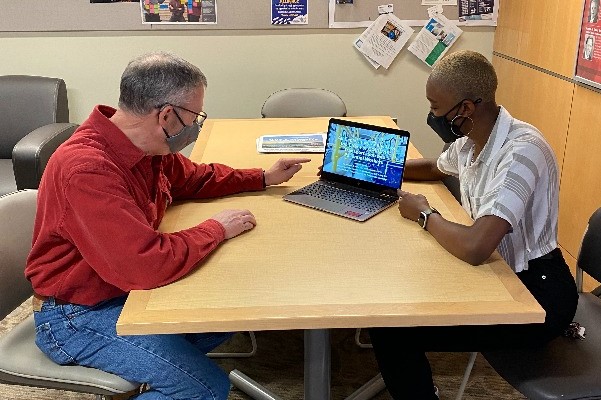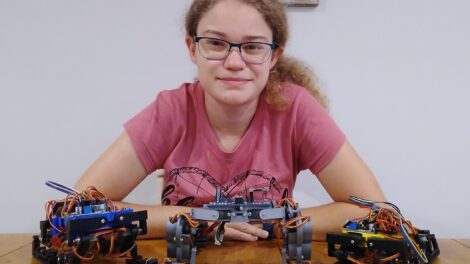Senior honors project showcases how student-faculty engagement flourishes at Lafayette, even under challenging conditions
By Bryan Hay
Undeterred by pandemic limitations, Jerri Norman ’21 (civil engineering) has been working on a senior honors project with Prof. Arthur Kney and Dr. Mosi London ’10 on how COVID-19 has affected public transportation, essential workers, and policy implementation.
“I wanted to focus on COVID-19 and the impacts that it has had on essential workers, and tie that back in with what I’ve been doing in civil engineering,” Norman says. “I started looking at the top public transportation hubs in the United States. And so that kind of narrowed everything down to just looking at specific cities to see how those cities handled transportation policy and policy in general during the early months of COVID-19, and how that may have affected people in the long run. At the conclusion of the fall semester, I had some pretty nice findings.”

Prof. Arthur Kney and Jerri Norman ’21
Their work this semester is focused on a survey that will help determine how essential workers have been affected by COVID-19 regarding transportation access and mobility in the top 10 U.S. cities with the most transit travel.
Norman’s research is taking that a step further by looking at how public transit shutdowns affected elderly populations residing in environmental justice zones when essential workers could not get to work.
“We’re looking at things now in a bigger picture,” she says.
So far, the biggest takeaway from the research is the undeniable link between transportation, public health and other essential services, says London, transportation planning project manager within the transportation planning group at AECOM, a multinational infrastructure consulting firm.
“Transportation is the means by which we deliver food to grocery stores and vaccines to patients,” he says. “However, with increased demand and disruptions in the supply chain, it impacts not only the end users but those who provide those services from truck drivers and pilots to warehouse workers and package handlers. Their safety and health should be paramount, and the research shows that not enough is known about the impact the pandemic has had on them.”
Despite the very serious topic of the research, London says he has enjoyed working with Kney and Norman.
“Like most researchers studying the impacts of COVID-19, there is a lot that we didn’t know at the start,” he says. “However, through the literature review of surveys and reports, and analysis of transit and traffic data as well as morbidity and mortality rates, we gain a better understanding of the varying degree of impacts across the United States, and, even more importantly, the possible reasoning to why those differences exist.”
Norman’s drive to pursue original research has impressed Kney, acting department head of civil and environmental engineering.
“She started from nothing and crafted the outline for her thesis on her own,” Kney says. “Many times students come into projects that are already kind of cast or tasked. Jerri really put this together and assembled a team. That drive to go forward is why we call it an honors project.”
Norman, who is considering a career in urban planning, says they were driven to explore the pandemic’s effect on essential workers after hearing numerous news reports covering the issue.
“Reading about those stay-at-home orders that came out last March just heightened my curiosity,” she says. “It’s been eye opening. It’s become something that I’m very passionate about.”
Their work is another example of student-faculty engagement, which flourishes at Lafayette, even under challenging conditions, and the opportunity to work on a significant project with an alumni mentor.
“In addition to Dr. London’s help with the methodology of data acquisition, working with an alumnus of his stature was helpful for career guidance and mentorship,” Norman says. “These kinds of opportunities help students prepare for their future. Lafayette engineering professors/advisers push you to be the best version of yourself through guidance and resources that ready you to pursue your career goals and aspirations.”


